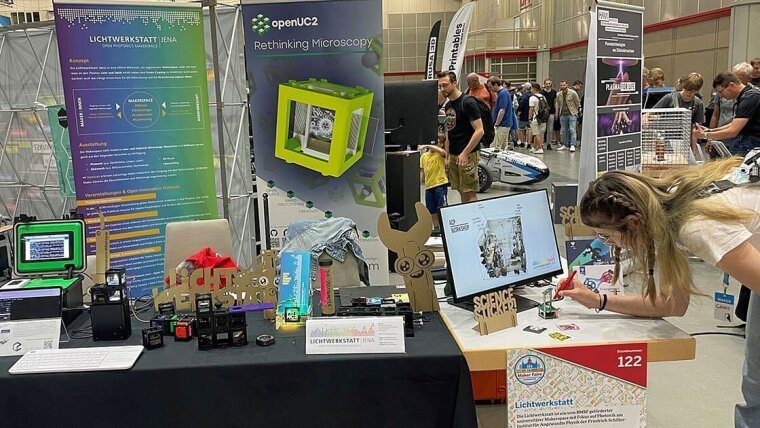
- Light
Published: | By: Photonik Forschung Deutschland, English translation by Gleb Chupakhin
A large and vibrant community has formed since the early days of the Maker Movement in Germany that has often borne ideas that sparked tomorrow's innovations. The Maker Faire HannoverExternal link is the meeting place for everyone who wants to participate and find inspiration in that community.
On August 17th and 18th, the event opened its doors for the tenth time. Around 15,800 participants attended to tinker and experiment in three halls and in the outdoor area of the Congress Centrum. The exhibitors ranged from individual makers, educational institutions, and scientific institutes to companies. In her video messageExternal link, the sponsor Federal Research Minister Stark-Watzinger praised the festival's unique climate of innovation: "There's no such thing as 'can't be done.' That's what the Maker Faire Hannover represents. It’s a home away from home for everyone who just wants to create".
From Photonics to Quantum Technologies
Open workshops like "FabLabs" and "Hackerspaces" provide tinkerers with the tools and technical know-how they need to advance their ideas. Over the past ten years, this environment has also given rise to numerous photonics projects, many of which have been funded by the German Federal Ministry of Education and Research (BMBF)External link However, time doesn’t stand still. Today, photonic solutions are seen as trailblazers for the quantum technologies that have become integral to many new BMBF-funded projects. Some pioneering quantum technologies are already accompanying us in our daily lives. Especially at this early stage, it's crucial to engage the public: to spark their interest, help them understand these technologies, and to make the technological potential tangible. The Maker Faire provides an ideal environment for this purpose.
QuantumMiniLabs and others: Many BMBF-Funded Projects
At the joint booth initiated by Ruhr West University of Applied Sciences in the Eilenriedhalle, attendees could playfully familiarize themselves with quantum technologies. Professor Michael Schäfer, an instructor of Technical Informatics at the university and the booth's organizer, expressed his enthusiasm about the event: “With the motto Your Quantum Future, we successfully introduced an unusual topic for the Maker Faire, garnered a lot of attention, and received positive feedback. The DIY quantum physics activities, designed to boost motivation and learning success, were particularly well-received by visitors,” said Schäfer. The joint booth provided an ideal setting with a wide range of offerings from the Ruhr West University FabLab External link and projects from the BMBF-funded initiatives Quantum Future EducationExternal link and Quantum AktivExternal link.
QuantumMiniLabsExternal link arrived with self-learning kits. This project, in which the Abbe Center of Photonics with its Lichtwerkstatt are also partners, aims to bring quantum theory experiments out of the lab, simplify them, and integrate them into mini-labs. These kits offer universities, schools, and small and medium-sized enterprises (SMEs) a more accessible alternative to the complex setups that typically require a full laboratory. The kit will be available as low-cost, expandable open-source hardware. The basic kit, consisting of about 20 modular elements for lasers, lenses, and electronic components, is expected to be put into practical use in the near future. In the initial phase, 100 places of learning will be equipped with these kits. To ensure the kits are quickly and easily integrated into school routines, specially trained coaches will support teachers.
Another attraction was a genuine 3-qubit quantum computer from the Quantum LifeLong Learning projectExternal link, which visitors could both admire and program. Some festival guests were awed by the small size of the computer, initially mistaking the unexpectedly compact machine for a printer. This confusion is understandable, as quantum computers are often thought of as large installations. The booth also featured two quantum innovation prize wheels. Each spin of the wheels produced an intriguing combination of an application and a use case for quantum sensors, sparking collaborative brainstorming sessions with researchers from the Quantum Open Innovation projectExternal link. The goal of this project is to develop a low-cost open hardware kit and open-innovation approaches to make quantum research results accessible to various audiences. The kit is designed to be modular and expandable, allowing for the prototyping of application ideas tailored to different needs.
Lichtwerkstatt Jena and OpenUC2 GmbH on the German Maker Landscape
Directly opposite was the booth of the Lichtwerkstatt JenaExternal link. The Lichtwerkstatt is a university makerspace funded by the BMBF focused on photonics. Here, visitors could engage in various quantum photonics experiments, explore a 3D-printed kit for optics experiments, and much more. The Lichtwerkstatt is dedicated to transforming contemporary research into prototypes and DIY projects. The aim is to make interesting experiments and technologies accessible and tangible for everyone. Researchers of the LichtwerkstattPro projectExternal link are working to establish open innovation processes in small and medium-sized enterprises (SMEs) within the photonics industry.
And the Conclusion?
The BMBF-funded projects impressed visitors with their successful blend of technological diversity and practical relevance. They took festival guests on a journey into the world of photonics and quantum technologies. The event's distinctive do-it-yourself spirit and inventive atmosphere encourage the new and lay a strong foundation for the innovations of tomorrow that will help strengthen Germany's economic position.
For more information about the numerous BMBF-funded collaborative projects and their partners, please visit the respective project pages.
Original article (in German) with additional pictures:
Quantentechnologien zum Anfassen auf der Maker Faire HannoverExternal link